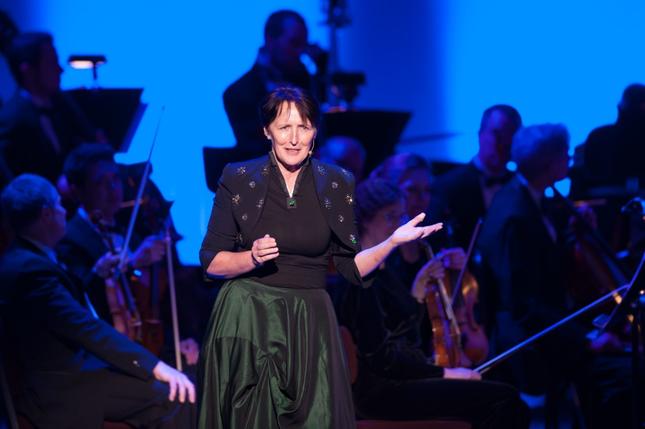‘Ireland 100’ Begins at the Kennedy Center
By • May 25, 2016 0 1193

The legendary Irish actress Fiona Shaw, acting as both director and long-gowned host of the opening night of the Kennedy Center festival “Ireland 100: Celebrating a Century of Irish Arts and Culture” at the Concert Hall, referred often to the contrasting fact that Irish culture, while it has the energy and variety of the modern, is rooted in ancient traditions.
There were lots of opportunities during the course of the evening — which amounted to a rapid presentation of highlights of the festival, something like a tasting menu — to see that premise in action. The festival itself was full of contemporary artists (visual, performing, music, theatrics, dancing) reaching backwards while making art for the here and now to echo in the future.
Lots of folks were there wearing green of one sort or another — shoes, jackets, shirts and ties and the odd bow tie — to acknowledge their roots, one supposes, this town being a pretty good celebrator of Irish drink, music and theater on a day-to-day basis. The guys at the security passages were not wearing green, and neither was the German shepherd, a working dog also on hand for security reasons.
All this bustling and checking and shuffling, on account of the presence of Vice President Joe Biden (with Finnegan family roots) and Enda Kenny, the Prime Minister of Ireland or Taoiseach, got things off a little slowly. Kenny proved to be a full-throated champion of Irish culture, which he said was spurred by a gift “for living in the moment,” not in the past and not yet in the future. Kenny noted the omnipresence of technology in modern life, how phones and screens become the center of attention, with owners seeking authenticity in a small frame, to the blissful disregard of everything around them. “I think you’ll find that what we have to offer is about right now, right this minute, in music, in dancing, in the arts and our culture.”
Shaw, always an imposing and often unforgettable presence on stage, trod lightly as a hostess, as did the program; there was not a lot of time for lingering, or malingering, for that matter. We got the essence of the here and now, and the now that was then, and the ancient past. Nothing seemed more characteristic and less familiar at the same time as the playing of a medley of songs on the traditional Irish Pipes, the Uilleann, different than most instruments because it is played through the elbows. The music — led by Amy Campbell, who is blind — was keening, rhythmic and strange; it sounded like something that was just born. Just as dramatic, and clear as a tear-given voice, was a saga of traditional Irish singing by a man with the wonderfully resonant name of Iarla O Lionaird.
There was a pianist, Barry Douglas, playing a nocturne; there was the Irish dancer Colin Dunne, who charged down the aisle clog-dancing with precise, even marshaled steps; there was an Irish tenor, Anthony Kearns, singing “Down by the Salley Gardens”; there was an Irish mezzo-soprano, Tara Erraught, singing with great and coquettish vitality from “Falstaff”; and there was a fiddler (there is always a fiddler in Irish celebrations).
And there was Shaw herself, reciting William Butler Yeats’s great poem “Easter, 1916,” when things were “utterly changed … transformed utterly,” “a terrible beauty is born.”
Yeats sounded the telling literary note about the Easter Rising in Ireland. It is part of “Ireland 100,” the celebration and commemoration of those events that led to years of division, defiance and the Troubles, even as Ireland transformed once again.
Part of the celebration — its site at the Kennedy Center — is of course the Irish-American relationship, and the president who embodied that culture and history, who in 1963 visited his homeland and spoke to the parliament there and quoted George Bernard Shaw, another literary giant in a land which seems unduly rich in them: “I dream things that never were; and I say, ‘Why not?’”

